笔译人称与物称-
- 格式:doc
- 大小:31.00 KB
- 文档页数:2
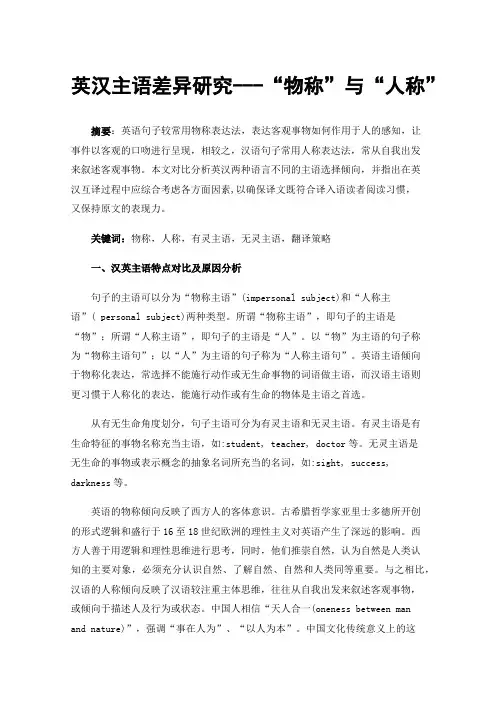
英汉主语差异研究---“物称”与“人称”摘要:英语句子较常用物称表达法,表达客观事物如何作用于人的感知,让事件以客观的口吻进行呈现,相较之,汉语句子常用人称表达法,常从自我出发来叙述客观事物。
本文对比分析英汉两种语言不同的主语选择倾向,并指出在英汉互译过程中应综合考虑各方面因素,以确保译文既符合译入语读者阅读习惯,又保持原文的表现力。
关键词:物称,人称,有灵主语,无灵主语,翻译策略一、汉英主语特点对比及原因分析句子的主语可以分为“物称主语”(impersonal subject)和“人称主语”( personal subject)两种类型。
所谓“物称主语”,即句子的主语是“物”;所谓“人称主语”,即句子的主语是“人”。
以“物”为主语的句子称为“物称主语句”;以“人”为主语的句子称为“人称主语句”。
英语主语倾向于物称化表达,常选择不能施行动作或无生命事物的词语做主语,而汉语主语则更习惯于人称化的表达,能施行动作或有生命的物体是主语之首选。
从有无生命角度划分,句子主语可分为有灵主语和无灵主语。
有灵主语是有生命特征的事物名称充当主语,如:student, teacher, doctor等。
无灵主语是无生命的事物或表示概念的抽象名词所充当的名词,如:sight, success,darkness等。
英语的物称倾向反映了西方人的客体意识。
古希腊哲学家亚里士多德所开创的形式逻辑和盛行于16至18世纪欧洲的理性主义对英语产生了深远的影响。
西方人善于用逻辑和理性思维进行思考,同时,他们推崇自然,认为自然是人类认知的主要对象,必须充分认识自然、了解自然、自然和人类同等重要。
与之相比,汉语的人称倾向反映了汉语较注重主体思维,往往从自我出发来叙述客观事物,或倾向于描述人及行为或状态。
中国人相信“天人合一(oneness between manand nature)”,强调“事在人为”、“以人为本”。
中国文化传统意义上的这种人本文化的长期积淀,形成了汉民族主体型的思维方式,即以人文为中心来观察、分析、推理和研究事物的思维。
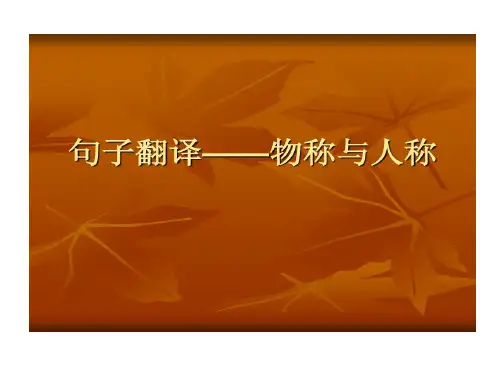
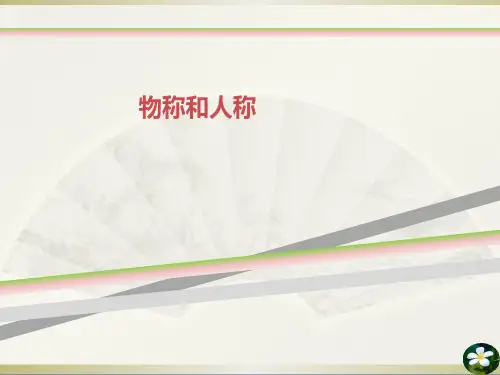
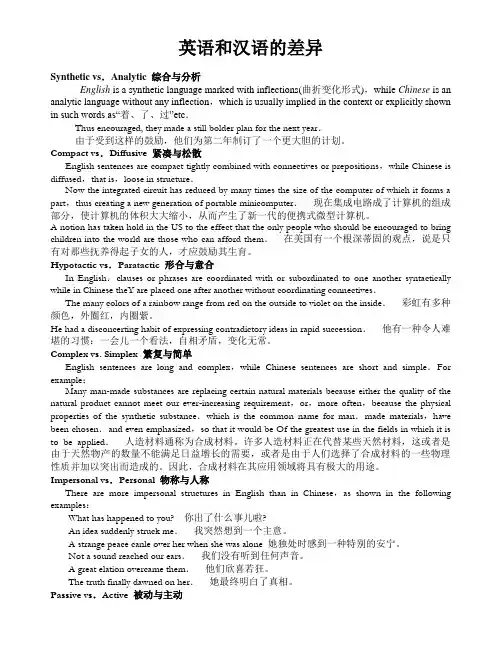
英语和汉语的差异Synthetic vs.Analytic 综合与分析English is a synthetic language marked with inflections(曲折变化形式),while Chinese is an analytic language without any inflection,which is usually implied in the context or explicitly shown in such words as“着、了、过”etc.Thus encouraged, they made a still bolder plan for the next year.由于受到这样的鼓励,他们为第二年制订了一个更大胆的计划。
Compact vs.Diffusive 紧凑与松散English sentences are compact tightly combined with connectives or prepositions,while Chinese is diffused,that is,loose in structure.Now the integrated circuit has reduced by many times the size of the computer of which it forms a part,thus creating a new generation of portable minicomputer.现在集成电路成了计算机的组成部分,使计算机的体积大大缩小,从而产生了新一代的便携式微型计算机。
A notion has taken hold in the US to the effect that the only people who should be encouraged to bring children into the world are those who can afford them.在美国有一个根深蒂固的观点,说是只有对那些抚养得起子女的人,才应鼓励其生育。

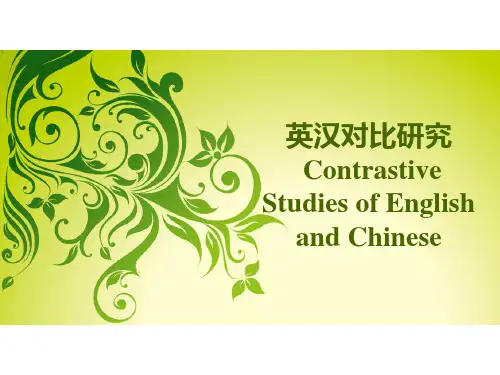
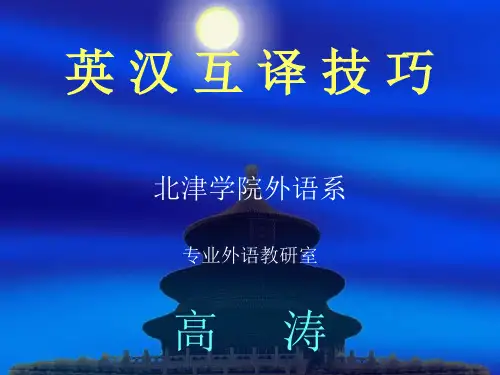

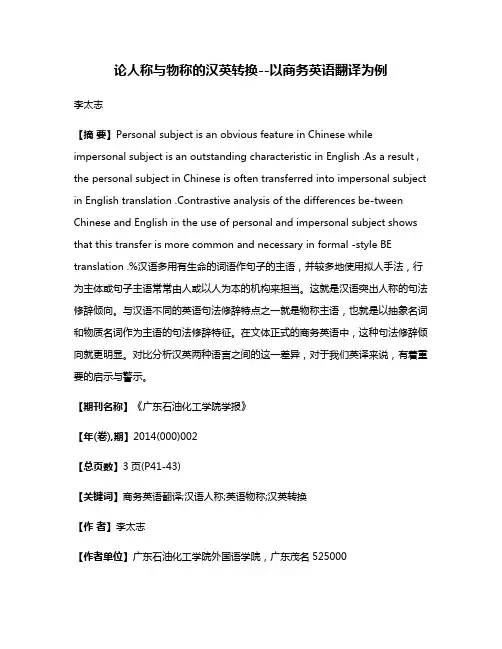
论人称与物称的汉英转换--以商务英语翻译为例李太志【摘要】Personal subject is an obvious feature in Chinese while impersonal subject is an outstanding characteristic in English .As a result , the personal subject in Chinese is often transferred into impersonal subject in English translation .Contrastive analysis of the differences be-tween Chinese and English in the use of personal and impersonal subject shows that this transfer is more common and necessary in formal -style BE translation .%汉语多用有生命的词语作句子的主语,并较多地使用拟人手法,行为主体或句子主语常常由人或以人为本的机构来担当。
这就是汉语突出人称的句法修辞倾向。
与汉语不同的英语句法修辞特点之一就是物称主语,也就是以抽象名词和物质名词作为主语的句法修辞特征。
在文体正式的商务英语中,这种句法修辞倾向就更明显。
对比分析汉英两种语言之间的这一差异,对于我们英译来说,有着重要的启示与警示。
【期刊名称】《广东石油化工学院学报》【年(卷),期】2014(000)002【总页数】3页(P41-43)【关键词】商务英语翻译;汉语人称;英语物称;汉英转换【作者】李太志【作者单位】广东石油化工学院外国语学院,广东茂名525000【正文语种】中文【中图分类】H315.9在《英语交际语法》(1974)一书中,利奇(G.Leech)和斯瓦特威克(J.Svartvik)指出:“Formal written language often goes with an impersonal style;i.e.one in which the speaker does not refer directly to himself or his readers,but avoids the pronouns I,you,we.Some of the common features of impersonal language are passives,sentences beginning with it,and abstract nouns.”[1]钱歌川在《英语疑难详解》(1978)中说:“我们说中文时,惯常都要用人或生物做主语,而英文则爱用无生物做主语。
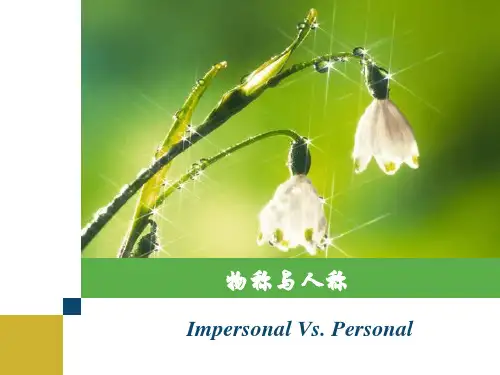
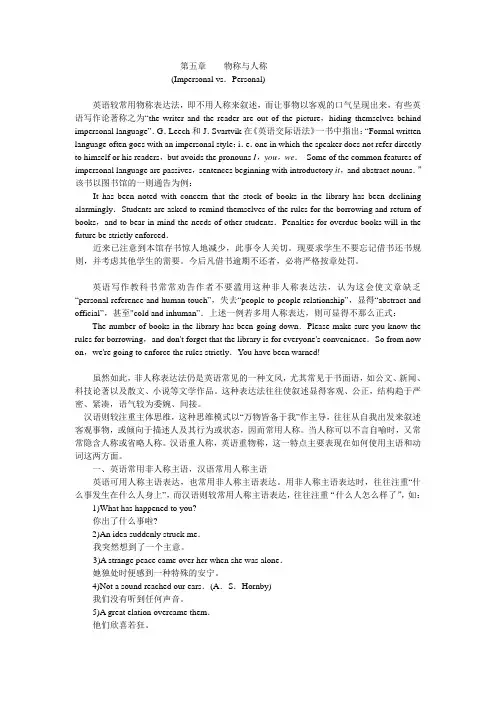
第五章物称与人称(Impersonal vs.Personal)英语较常用物称表达法,即不用人称来叙述,而让事物以客观的口气呈现出来,有些英语写作论著称之为“the writer and the reader are out of the picture,hiding themselves behind impersonal language”.G.Leech和J.Svartvik在《英语交际语法》一书中指出:“Formal written language often goes with an impersonal style:i.e.one in which the speaker does not refer directly to himself or his readers,but avoids the pronouns I,you,we.Some of the common features of impersonal language are passives,sentences beginning with introductory it,and abstract nouns.”该书以图书馆的一则通告为例:It has been noted with concern that the stock of books in the library has been declining alarmingly.Students are asked to remind themselves of the rules for the borrowing and return of books,and to bear in mind the needs of other students.Penalties for overdue books will in the future be strictly enforced.近来已注意到本馆存书惊人地减少,此事令人关切。
笔译基础语法知识点总结一、名词名词是表示人、事物、地点、状态等概念的词类,是语言中最基本的词类之一。
在笔译中,正确理解和运用名词的语法知识对于保持原文意思的准确性至关重要。
以下是名词的一些语法知识点:1. 单数与复数形式名词有单数和复数两种形式,单数表示一个,复数表示多个。
在英语中,一般在名词后加-s或-es来表示复数形式,但也有一些不规则的变化规则需要注意。
2. 可数名词与不可数名词可数名词是指可以用来计算数量或者有单复数变化的名词,如book(书)- books(书籍),而不可数名词则是指无法用于单复数变化或者表示不可数的名词,如water(水),其中water是不可数名词,无法用于单复数变化。
3. 特殊名词一些名词在变为复数形式时存在不规则的变化,例如:man(男人)-men(男人们),woman(女人)-women(女人们)等。
4. 名词所有格在表示所有关系时,名词需要用' s 或者 of 来表示,如:the boy's book(男孩的书), the book of the boy(男孩的书)5. 名词修饰名词可以被定语修饰,通常和名词放在一起的词类包括:形容词、副词、介词短语等。
二、动词动词是句子中最重要的一类词,它可以表示行为或状态。
在笔译中,正确理解和使用动词的语法知识对于保持原文意思的准确性至关重要。
以下是动词的一些语法知识点:1. 时态动词的时态表示动作或状态发生的时间,有一般现在时、一般过去时、一般将来时等。
在笔译中,要根据上下文准确使用时态,确保译文的准确性。
2. 语态动词的语态包括主动语态和被动语态。
在笔译中,要根据上下文准确使用语态,使译文表达出原文的含义。
3. 情态动词情态动词包括can, could, may, might, must等,用来表示情态的语气。
在笔译中,情态动词的使用要根据上下文准确进行翻译,以保持原文的逻辑连贯性。
4. 动词时态和语态的转换在笔译中,动词时态和语态的转换常常涉及到句子结构和语法规则的变化。
Impersonal vs. Personal (物称与人称)(主语)
English: impersonal. Formal written language often goes with an impersonal style; i.e. one in which the speaker does not refer directly to himself of his readers, but avoids the
pronouns I, you we. Some of the common features of impersonal language are passives,
sentences beginning with introductory it, and abstract nouns.
Chinese: personal. 汉语较注重主体思维,这种思维模式以“万物皆备于我”作主导,往往从自我出发来叙述客观事物,或倾向于描述人及其行为和状态,因而常用人称。
当人称可以不言自喻时,又常常隐含人称或省略人称。
A. 英语用非人称作主语的句子大体可以分为以下两类:
1. 采用“无灵主语”(inanimate subject)表示抽象概念、心理感觉、事物名称或时间地点等,
但谓语却常常使用“有灵动词”(animate verb),表示人或社会团体的动作和行为,如see, find, bring, give escape, surround, kill, deprive, seize, send, know, tell, permit, invite, take, drive, prevent…from等。
汉语的“有灵动词”一般只能与人称搭配。
汉语往往用人或比较确定的事物作主语。
a.An idea suddenly struck me.
b. A strange peace came over her when she was alone.
c. A great elation overcame them.
d.From the moment we stepped into the People’s Republic of China, care and kindness
surrounded us on every side.
2. 用非人称代词“it”作主语;汉语常用人称,或省略人称,或采用无主句。
a.用作先行词(preparatory “it”), 代替真正的主语或宾语(“to represent a whole group of
words which it would not be convenient to put in the place required by the ordinary rules of word-order without causing ambiguity or obscurity”)
It never occurred to me that she was so dishonest.
b.用作虚义词(unspecified “it”), 代替的主语是难以言明的现象或情形,如用以表示自然现
象、时间、空间以及惯用语中
How is it with the sick man?
It’s windy today.
c.用作强调词(emphatic “it”)
It is in the hour of trial that a man finds his true profession. (B. Shaw)
It is a good horse that never tumbles. (proverb)
d.英语的“there be”句式以及不定代词“one”作主语的句子也有非人称倾向.
One must be a servant before one can be a master. (proverb)
B.英语常用被动式,采用物称表达法;汉语常用主动式,采用人称、泛称或隐称表达法。
A current search of the files indicates that the letter is no longer in this Bureau’s possession. It is noted that the letter was received two months ago and after study, returned to your office. In view of the foregoing, it is regretted that your office has no record of its receipt. If the letter is found, it would be appreciated if this Bureau was notified at once.
家庭作业:
1. Excitement deprived me of all power of utterance.
2. The thick carpet killed the sound of my footsteps.
3. The forty years, 1840-80, brought almost ten million migrants to America.
4. The little chap’s good-natured honest face won his way for him.
5. Friday started with a morning visit to the modern campus of the 22,000-student University
of Michigan in nearby Ann Arbor, where the Chinese table tennis team joined students in the cafeteria line for lunch and later played an exhibition match.
6. It is a long lane that has no turning.
7. It is an ill bird that fouls its own nest.
8. It is an ill wind that blows nobody well.
9. It is a wise man that never blunders./Even homer nods。